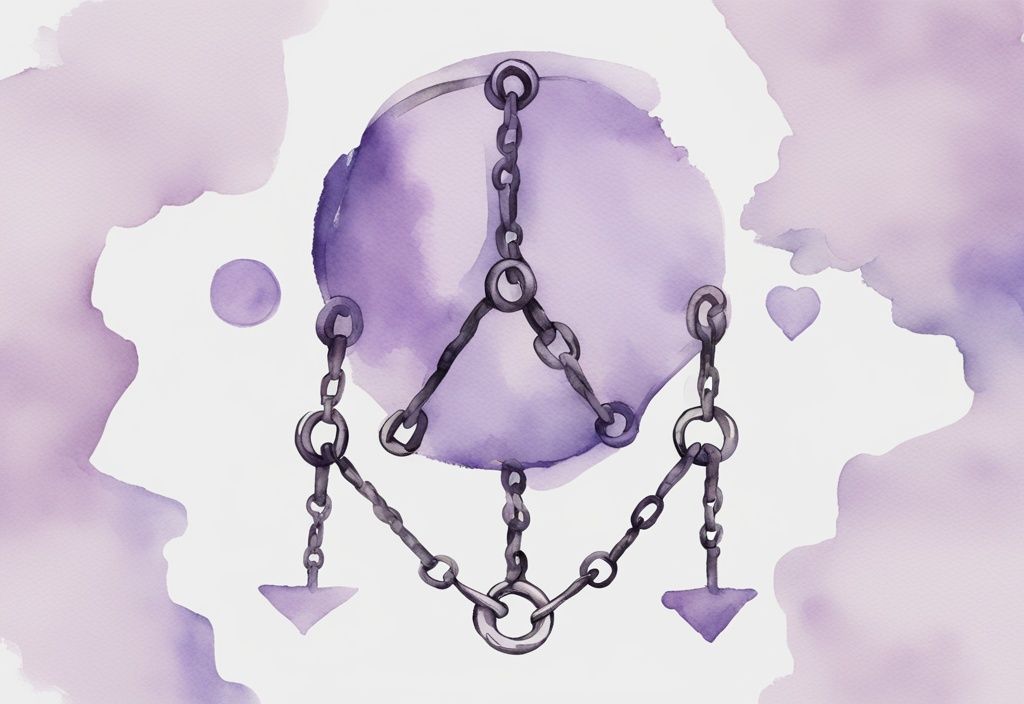8 Signs of a Toxic Mother-Raised Childhood: Decode Your Past
Was your childhood marked by a lingering unease or self-doubt? Are you running into trust issues or struggling with stress management even as an adult? These could be prominent signs you were raised by a toxic mother. Having a toxic maternal relationship can etch deep emotional scars that influence your self-image, interpersonal relationships, and worldview.
In this enlightening article, you’ll come face-to-face with eight common indicators of a toxic mother-daughter dynamic, and how it may have shaped your mental and emotional health. Understanding these signs is the first step towards healing and reclaiming control over your life.
Join me, Elena Hartley, as I delicately unravel these signs – paving the way for awareness, understanding, and ultimately, your journey towards healing and recovery.
1. Low Self-Esteem
Growing up with a toxic mother can deeply affect how you see yourself. The constant belittling and emotional abuse contribute significantly to the development of low self-esteem, affecting various aspects of your life.
Consistent Belittling and Criticism
- Development of Low Self-Worth: Imagine facing a constant barrage of negative comments and put-downs from your mother. It’s no wonder you might struggle with self-worth. These persistent and harmful messages can become internalized, making it difficult to see your true value.
- Feeling Inadequate: When you’re told over and over that you aren’t good enough, this belief can become ingrained in your psyche, contributing to feelings of low self-esteem, as noted by experts who emphasize the impact of disapproval from important others on self-worth (Psychology Today). This relentless criticism feeds a perpetual feeling of inadequacy, leading to a never-ending quest for approval that always seems out of reach.
- Internalizing Negative Descriptors: Hurtful labels and descriptors given by a toxic mother can embed themselves in your self-image. These negative self-talk habits chip away at your confidence, making it challenging to feel competent in multiple areas of life.
Emotional Abuse and Undermining
- Emotional Manipulation: A toxic mother often uses emotional manipulation to maintain control, which can involve guilt-tripping, shaming, or other tactics that leave you feeling responsible for her emotional state. This manipulation creates a damaging cycle of blame and guilt.
- Inconsistent and Hurtful Remarks: Erratic and demeaning comments can severely undermine a sense of achievement. When your positive efforts are met with hurtful remarks, it diminishes any sense of accomplishment and reinforces your low self-esteem.
-
Negative Self-Perception: Continuous emotional abuse fosters a deeply rooted negative self-perception. You might start to believe you’re inherently flawed or unworthy, severely affecting your relationships and life choices.
In this video, discover the 8 signs you may have been raised by a toxic mother, including conditional love, emotional manipulation, and lack of boundaries. Understanding these signs is crucial for your healing journey.
2. Lack of Boundaries
Boundaries serve as the invisible lines that protect personal space and autonomy. However, growing up with a toxic mother often means these lines are crossed continuously, leaving lifelong impacts on one’s sense of self and security.
Overstepping Personal Space
- Invading Privacy: Picture this: your mother barges into your room without knocking, rifling through your diary or personal items. This constant intrusion fosters an environment drenched in mistrust and insecurity, making you feel like your sanctuary is always at risk.
- Coercing Decisions: What happens when your preferences are ignored, and choices are made for you? A toxic mother decides what you wear, who you befriend, or what activities you pursue, rendering your opinions insignificant. This persistent overriding of your autonomy leaves you feeling helpless and out of control.
- Disregarding Desires: Imagine your interests and needs being downplayed or dismissed entirely. When a mother imposes her views and schedules on you, your sense of value and visibility vanishes. It’s a slow erasure of your identity, pushing you into the shadows of her demands.
Feelings of Invasion
- Constant Monitoring: Envision never getting a moment of privacy. Your mother tracks your every move, creating a never-ending sensation of being watched and judged. Such constant surveillance stifles personal growth and independence, leaving no room for you to develop on your own.
- Inability to Assert Boundaries: Setting personal boundaries feels impossible under an authoritarian mother. The consistent breach into your personal space disrupts your mental state, making it difficult to establish a sense of self. You’re left on edge, unable to create a protective barrier around your emotions and thoughts.
- Sense of Violation: This persistent overreach leaves a lingering discomfort and a palpable sense of personal violation. The intrusion erodes your sense of safety and trust, turning your environment into a place of unease rather than a haven. It hampers your ability to feel secure, affecting your overall well-being.
3. Poor Coping Mechanisms
Growing up with a toxic mother can profoundly impact the way one learns to manage stress and emotions. These coping mechanisms, often developed to survive a tumultuous upbringing, can hinder emotional and psychological well-being long into adulthood.
Difficulty Managing Stress and Anger
- Developing unhealthy coping strategies: When your mother’s influence is toxic, you might find yourself leaning towards avoidance, substance use, or other unhealthy coping mechanisms. These behaviors develop as a way to navigate the relentless instability at home.
- Frequent feelings of being overwhelmed: The absence of consistent emotional support can make stress feel like a heavy fog that is impossible to see through, leaving you perpetually overwhelmed and struggling to cope with life’s demands.
- Outbursts of anger or emotional shutdown: In moments of high stress, you might react with intense anger or shut down completely. This is often a direct outcome of the poor emotional regulation skills instilled during a difficult upbringing.
Anxiety and Inability to Handle Emotions
- Persistent anxiety: Growing up where chaos is the norm makes feeling relaxed rare. The unpredictable environment keeps you in a constant state of alertness and worry, affecting your ability to find calm in other areas of life.
- Struggling to manage and express emotions: With a toxic mother’s inconsistent emotional responses shaping your early years, expressing your own emotions can become a labyrinth. It’s hard to understand and articulate what you feel when you’ve never seen it modeled in a healthy way.
- Intense fear or worry about failure or judgment: The critical and unpredictable reactions you’ve internalized create a looming fear of judgment and failure. This fear can be paralyzing, preventing you from taking even the smallest risks.

4. Negative Outlook on Life
Growing up under the constant shadow of negativity can deeply shape your perspective. This section delves into how a toxic mother instills a pessimistic outlook, affecting your ability to find joy and positivity in life.
Perpetuating Negativity and Ruining Fun
- Consistently Dwelling on Negatives: Imagine a world where every silver lining is overshadowed by a cloud. If your mother always focuses on the gloom and doom in any scenario, it’s no wonder you might see the glass as perpetually half-empty.
- Infusing Joy with Negativity: Think about those moments that should have been bursting with joy. Yet, they’re stained with critical remarks, leaving you feeling like happiness is just out of reach.
- Ruined Celebrations: Special occasions, meant to be cherished, often came with a side of biting comments. Those jabs linger, turning what should be joyous memories into painful reminders of disapproval.
Exaggerating Problems and Assigning Negative Traits
- Magnifying Minor Issues: Have you ever felt like a minor misstep was treated as a catastrophe? A toxic mother has a knack for blowing things out of proportion, teaching you to see every bump in the road as an insurmountable obstacle.
- Expecting the Worst: You might find yourself bracing for disaster at every turn. This habitual pessimism is often a reflection of your mother’s constant forecasting of worst-case scenarios.
- Internalized Negative Beliefs: It’s one thing to hear criticism, and another to internalize it. Growing up, you might have absorbed those negative labels, letting them define your self-worth and image.
5. Fear of Rejection and Trust Issues
Inconsistent and conditional love establishes a chaotic emotional environment, leaving deep scars. This instability often manifests in three poignant ways:
Inconsistent and Conditional Love
- Growing up with the impression that love is earned, not freely given, generates an endless quest for validation. This perpetual striving for affection creates deep-seated insecurities and feelings of unworthiness, like trying to catch rays of the sun with bare hands.
- Behaving in specific ways to earn approval stifles authentic self-expression. This constant performance muddles your sense of identity, as if you’re always wearing a mask and forget your true face beneath it.
- Difficulty comprehending the concept of unconditional love makes trusting genuine, supportive relationships challenging. It’s akin to being trapped behind an invisible wall, unable to fully connect, leading to emotional distance and isolation.
Difficulty Forming Trusting Relationships
Trust forms the cornerstone of all meaningful connections, but a toxic upbringing can erode this foundation:
- Struggling to put faith in others stems from fearing that betrayal is inevitable, an apprehension that can hinder the formation of deep, meaningful connections. Imagine trying to build a bridge on a foundation that keeps shifting beneath you.
- Persistent suspicion and doubt in relationships create anxiety, erecting barriers to intimacy and open communication. It’s like viewing every new relationship through a foggy window, never seeing things clearly.
- Challenges in maintaining long-lasting relationships due to unresolved trust issues perpetuate cycles of alienation and loneliness. These unresolved feelings from the past are like ghosts haunting your present, keeping you from truly resting in the stability of a loving relationship.
Fear of Abandonment
Fear of abandonment can cast a long shadow over your relationships, manifesting in various ways:
- Chronic worry about abandonment disrupts daily life and exacerbates feelings of vulnerability. This persistent anxiety can be like a dark cloud following you everywhere, never allowing you to feel safe in any relationship.
- Displaying clingy and dependent behaviors stems from a desperate need for reassurance and security. This fear-driven behavior is akin to holding onto a fragile thread, worried it will snap at any moment, leaving you alone.
- Constantly seeking validation and reassurance from others results from unmet needs for consistent and stable emotional support during childhood. It’s like trying to fill a bottomless well, always seeking out what was never reliably provided.
6. Overachievement or Rebellion
When growing up in an environment dominated by a toxic mother, you may find yourself oscillating between overachievement and rebellion. Both of these extremes are coping mechanisms, responses to the intense pressure and unrealistic expectations set upon you.
Unrealistic Expectations and High Standards
- Children of toxic mothers often feel immense pressure to meet exceptionally high standards. This relentless demand for excellence is one of the 8 signs you were raised by a toxic mother. The constant push to be perfect leaves no room for errors, making the environment highly stressful.
- These unrealistic expectations create a relentless cycle of striving for perfection. You might find yourself pushing beyond your limits, fueled by a deep fear that falling short will lead to harsh criticism and disappointment.
- The fear of failure becomes deeply rooted, leading to paralysis in efforts and inhibiting your willingness to take risks or try new things. This constant anxiety can significantly stifle personal growth and experimentation.
Feeling Never Good Enough
- A persistent sense of inadequacy often haunts those raised by toxic mothers. No matter how hard you try or what you achieve, it never feels sufficient in the eyes of your mother, leaving you with a deep-seated belief that you are never good enough.
- This ceaseless pressure can manifest in two prominent ways: overachievement or rebellion. Overachievement often serves as a desperate attempt to earn validation, while rebellion becomes a means to assert independence or signal distress.
- One of the toughest battles you might face is struggling with self-acceptance and self-compassion. The continuous need for external approval makes it hard to cultivate a healthy sense of self-worth, leading to ongoing issues with self-esteem and confidence.
7. Feelings of Inadequacy
Growing up with a toxic mother often leaves deep-seated feelings of inadequacy. This can manifest in various ways, primarily through an incessant struggle for validation and approval.

Constant Struggle for Validation and Approval
- Imagine always feeling the need to prove yourself to earn a sense of worthiness. Children of toxic mothers often find themselves caught in the relentless pursuit of approval. This craving for praise becomes a means of feeling valued and recognized.
- This endless quest for validation can become an exhausting cycle. One might take on excessive challenges and overburden themselves, all in an effort to earn a fleeting moment of recognition. The constant need to prove one’s worth to others leaves little room for self-acceptance.
- The difficulty lies in the fact that self-worth becomes almost solely tied to external validation. It becomes challenging to cultivate an intrinsic sense of value, making individuals heavily reliant on others’ opinions to feel confident and good about themselves.
Seeking Constant Validation
- For those raised by a toxic mother, the confidence required to feel secure in oneself often becomes intricately linked to external praise and recognition. This deeply ingrained need for validation tends to persist into adulthood, hindering personal growth and self-assurance.
- This dependence on external affirmation becomes a coping mechanism. As adults, they might continuously seek reassurance from friends, colleagues, and partners, finding it difficult to appreciate their achievements without external input. This ongoing struggle to validate their abilities can be incredibly taxing.
- The fear of making decisions without someone else’s approval often dominates. This fear is a residue of years of second-guessing oneself— the result of a mother’s critical or dismissive nature. Consequently, individuals may experience indecisiveness and a significant lack of confidence in their personal judgment and decision-making abilities.
8. Emotional Neglect and Abuse
Emotional neglect and abuse can leave lasting scars, often shaping how we view ourselves and our relationships. Understanding these signs helps in recognizing the deep impact of a toxic upbringing and sets the groundwork for healing.
Isolation and Loneliness
- Emotional Neglect: Growing up with a toxic mother often means a lack of emotional support and understanding. Imagine being surrounded by loved ones yet feeling utterly alone. This sense of emotional isolation can leave a child longing for the connection they never received.
- Emotional Unprotection: When emotional neglect is intertwined with a lack of protection, it creates a fragile sense of self. Without a nurturing environment that promotes security, a child feels exposed and unsupported, much like a house without a foundation.
- Persistent Loneliness: The echoes of emotional neglect resonate throughout life, leading to persistent feelings of loneliness. Such distance from a mother’s affection can forge barriers to forming trusting relationships, as the foundation of emotional security was never laid.
Believing One is Undeserving of Love
- Internalized Unworthiness: One vivid sign of being raised by a toxic mother is this nagging belief of unworthiness. Constant criticism and absence of positive reinforcement can etch a narrative of inadequacy into the soul, much like unwanted graffiti on a beautiful wall.
- Difficulty Accepting Love: Emotional wounds make embracing affection a daunting task. When love feels foreign or unwelcome, it often stems from low self-esteem and a habit of self-doubt, akin to trying to nurture a plant in barren soil.
- Feeling Undeserving: The insidious feeling of being undeserving creeps into every aspect of life. It often taints the ability to enjoy happiness or relish positive experiences, leaving one feeling guilty and unworthy, casting long shadows over moments that should be luminous.
By recognizing these signs, you can take the first step towards healing and eventually fostering a healthier, more positive self-image. Understanding the impact of emotional neglect and abuse is critical in breaking the cycle and building a foundation for a better future.
Conclusion
Growing up under the shadow of a toxic mother can imprint deep emotional scars, influencing one’s perception of self and interactions with the world. Acknowledging these pervasive signs is paramount in initiating a healing journey, rebuilding self-esteem, personal boundaries, and healthier coping strategies.
8 Signs You Were Raised by a Toxic Mother
Identifying the tangible symptoms of a toxic mother’s influence is essential for personal growth and emotional recovery. The following signs can provide clarity and direction on this path:
1. Low Self-Esteem
Constant criticism from a toxic mother can severely erode your self-esteem. This incessant belittling fosters a lingering sense of inadequacy—you may often feel that nothing you do is ever good enough. The emotional manipulation that downplays your achievements takes a heavy toll on your confidence and self-worth, leaving you doubting your abilities.
2. Lack of Boundaries
A toxic mother frequently invades personal spaces and makes decisions on your behalf, eroding your sense of autonomy. This pervasive overstepping can make you feel constantly monitored and controlled, fostering discomfort and a diminished ability to assert your own boundaries in relationships and personal matters.
3. Poor Coping Mechanisms
Turmoil within the home often breeds unhealthy coping strategies. With insufficient emotional support during upbringing, managing stress becomes an uphill battle. Emotional outbursts and persistent anxiety can become commonplace, as you struggle to handle emotions that were never appropriately nurtured.
4. Negative Outlook on Life
A toxic mother’s incessant negativity can skew your perspective, making you prone to focusing on the worst aspects of any situation. Happy moments and celebrations may seem overshadowed by constant dampening, leading to a generally pessimistic outlook on life. Minor setbacks may feel catastrophic, significantly affecting your overall satisfaction and happiness.
5. Fear of Rejection and Trust Issues
Conditional love experienced growing up fosters a deep-seated fear of abandonment and trust issues. Suspicion and insecurity become barriers to forming meaningful relationships, making it difficult to trust others and maintain long-term bonds.
6. Overachievement or Rebellion
Unrealistic expectations from a toxic mother can push you towards extremes like overachievement or outright rebellion. Striving for perpetual validation, you may find yourself caught in a cycle of stress and fear of failure, driven by a never-ending quest to either meet impossible standards or reject them entirely.
7. Feelings of Inadequacy
Years of seeking validation, especially from a toxic mother, may root deep feelings of inadequacy within you. Relying on external approval to feel worthy can significantly impact your decision-making and self-perception, trapping you in an unending quest for affirmation.

8. Emotional Neglect and Abuse
Enduring emotional neglect leads to feelings of isolation, loneliness, and a belief that you are undeserving of love. This lack of emotional support creates barriers to accepting love and affection, foster long-term emotional struggles and making you feel emotionally distant from those around you.
Recognizing these signs is a crucial step towards healing. Embrace self-compassion, establish firm personal boundaries, seek professional guidance, and build a protective and supportive social network to counteract the adverse effects of being raised by a toxic mother. Your journey towards recovery and reclaiming your life starts with understanding and acknowledging your experiences.
Frequently Asked Questions
How can I heal from the effects of a toxic mother?
Healing from the emotional scars left by a toxic mother can be a challenging journey, but it is entirely possible with the right steps.
-
Engage with a therapist
Working through deep emotional wounds with a professional can be transformative. A therapist can guide you to better understand your experiences and develop healthier coping mechanisms. -
Cultivate self-compassion
Building self-worth starts with how you treat yourself. Establish self-care routines and learn to be gentle with your own feelings. -
Surround yourself with support
A network of supportive friends and loved ones can provide the emotional safety net you need to rebuild your confidence and self-esteem.
What are some strategies to manage low self-esteem developed from childhood?
Growing up with a toxic mother can deeply affect your self-esteem, but you can reclaim your self-worth with intentional practices.
-
Adopt positive affirmations
Replace negative self-talk with affirmations that reflect your true worth. This practice shifts your mindset and strengthens your self-esteem over time. -
Set achievable goals
Breaking down your goals into smaller, manageable steps and celebrating each accomplishment can build a sense of achievement and confidence. -
Engage in self-expression activities
Finding ways to express yourself, whether through art, music, or writing, can enhance your confidence and foster a healthier self-image.
How do I set boundaries with a toxic parent?
Establishing boundaries with a toxic parent is crucial for protecting your emotional health and fostering a sense of autonomy.
-
Communicate clearly
Articulate your personal boundaries in a straightforward manner and ensure you are consistent in enforcing them. -
Practice assertiveness
Being assertive helps reinforce your boundaries, making it clear that you are serious about maintaining them. -
Seek guidance
A therapist or support group can provide additional tools and emotional reinforcement as you navigate this challenging dynamic.
Can therapy help in overcoming trust issues caused by a toxic mother?
Therapy can play a pivotal role in addressing and overcoming trust issues that stem from being raised by a toxic mother.
-
Provides tools to rebuild trust
Therapists can guide you through the process of learning to trust again and foster healthier relationships. -
Effective therapeutic approaches
Techniques such as Cognitive-Behavioral Therapy (CBT) have proven particularly effective in this area. -
Addressing underlying fears
Therapy can delve into the root causes of your trust issues, helping you resolve underlying fears and anxieties.
What are the long-term effects of emotional neglect?
Emotional neglect can have profound and lasting effects, often manifesting in various areas of your life.
-
Feelings of loneliness
Persistent emotional isolation can linger, even in the presence of others, creating a sense of profound loneliness. -
Challenges in relationships
Forming and maintaining healthy relationships can become difficult, as trust and emotional intimacy might be compromised. -
Higher risk of mental health issues
The likelihood of experiencing mental health challenges such as depression and anxiety is significantly higher.














Post Comment